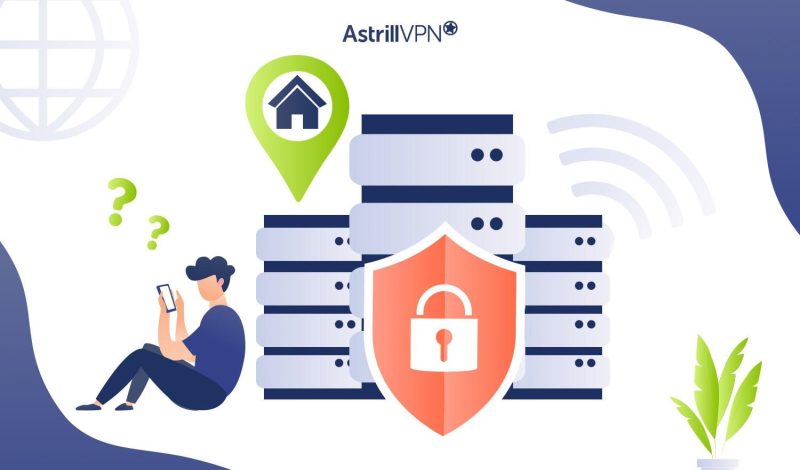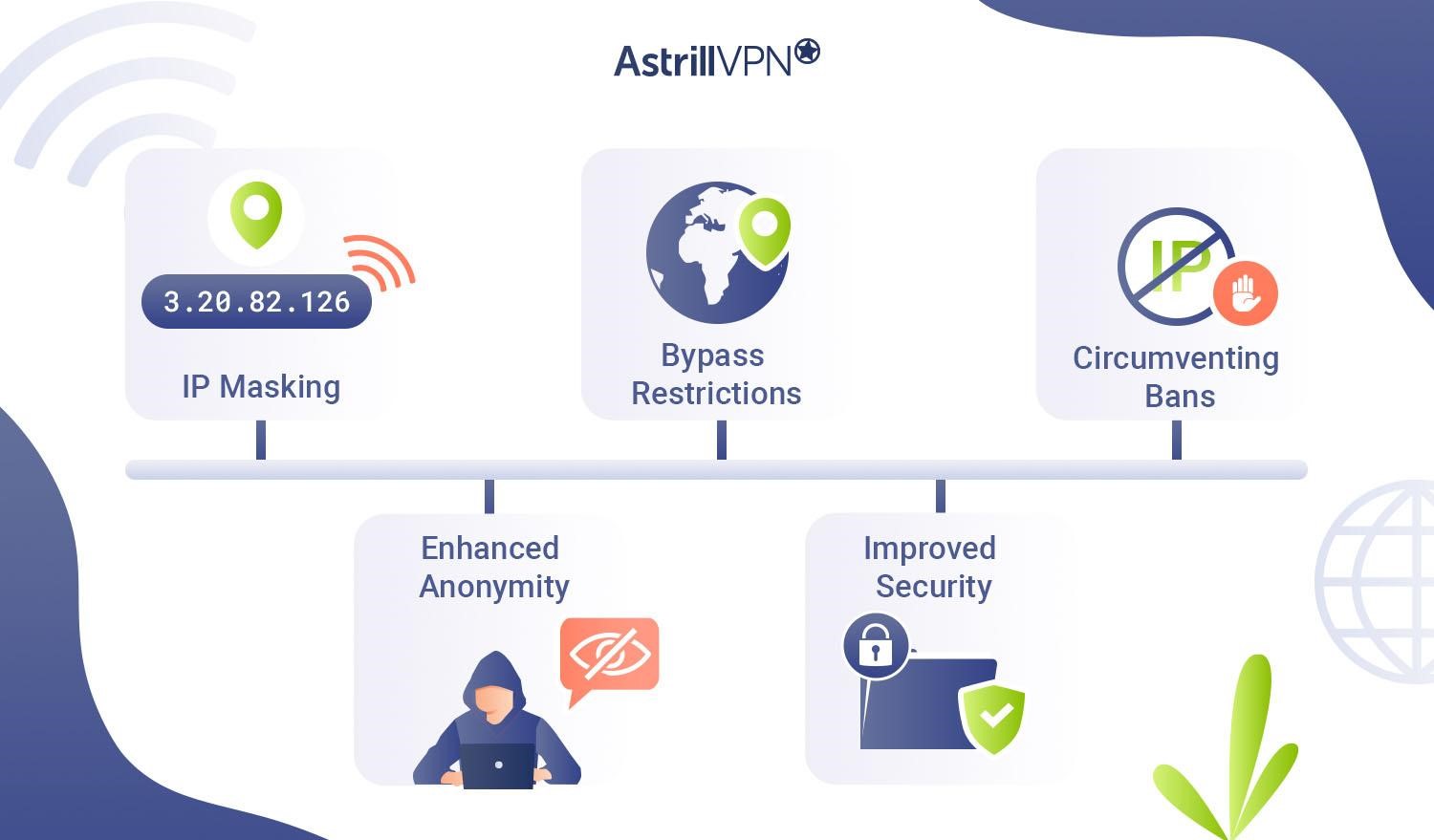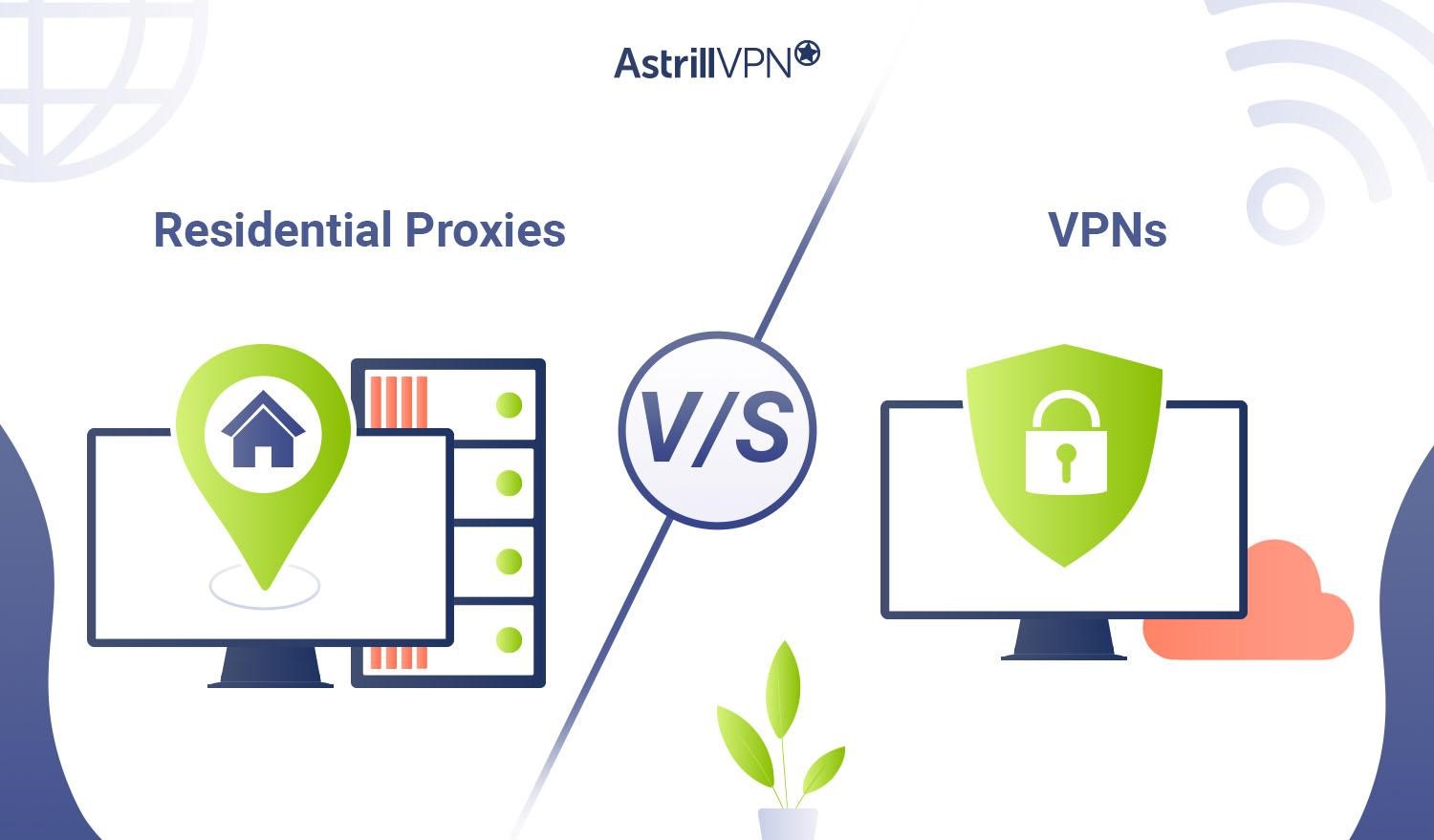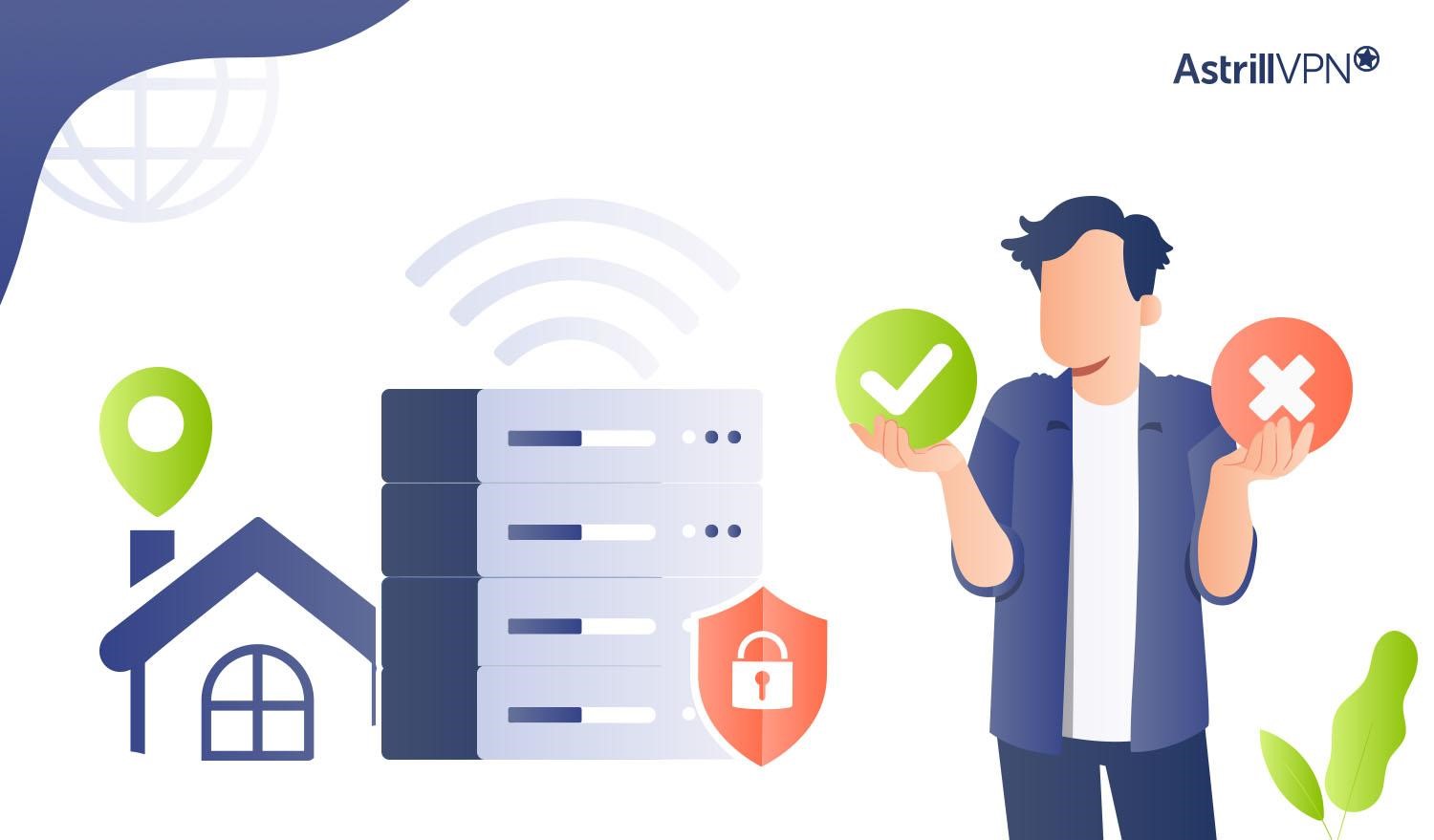What are Residential VPNs and Residential IP addresses?

Arsalan Rathore

Have you ever wondered if the IP assigned to you is shared by someone else? If you’re a VPN or proxy user, you should know that the servers you connect to are not specifically used by you but by many other users worldwide. Also, these IPs are provided by data centers, not ISPs themselves.
However, a residential VPN provides you with the real IP address from an actual ISP, which may guarantee access to many local or geo-restricted services without issue. If you’re not aware of what a residential VPN is how it works, and if a residential VPN is good for you or not, then go through this guide to learn all about it.
Table of Contents
What is a Residential IP address?
A residential IP address is assigned to devices (such as computers, smartphones, or other networked devices) by an Internet Service Provider (ISP). These IP addresses are associated with a specific physical location and are allocated to individual homes or businesses.
The term “residential” distinguishes these IP addresses from those provided by data centers or commercial entities. Residential IPs are associated with real, physical residences, making them more genuine and less likely to be flagged as suspicious or associated with malicious activities.
What is a Residential VPN, and how does it work?

A residential VPN utilizes servers associated with residential IP addresses instead of servers in data centers. This type of VPN service routes your internet traffic through these residential IP addresses, masking your IP address with one from the VPN provider’s pool of residential IPs.
IP Masking
When you connect to a residential VPN server, your actual IP address is replaced with one from the VPN server’s pool of residential IPs. This makes it appear that your internet connection originates from a different location.
Enhanced Anonymity
Residential VPNs offer increased anonymity and privacy since these IP addresses are associated with real residences, making it harder for websites or services to track your online activities back to your location.
Bypass Restrictions
Residential VPNs can help bypass geo-blocked content by allowing users to access region-restricted websites or services. For instance, if a website restricts access to certain regions, a residential VPN with an IP address from an allowed region can grant access.
Improved Security
VPNs encrypt your internet traffic, securing it from potential eavesdropping or monitoring by hackers or your ISP. This encryption ensures that your data remains private and secure as it travels between your device and the internet.
Circumventing Bans
In some cases, residential VPNs circumvent bans or restrictions imposed by websites or services. However, it’s essential to note that while a VPN may help bypass restrictions, violating terms of service or engaging in illegal activities remains prohibited.
Why You Should Use a Residential VPN
A residential VPN offers several advantages and serves various purposes, making it a valuable tool for enhancing your online experience. Here are some reasons you should use a residential VPN:
Enhanced Online Privacy and Security
Residential VPNs provide unparalleled online privacy by utilizing genuine residential IP addresses, effectively masking your location and making it exceedingly challenging for entities to track your online activities. The encryption protocols employed by these VPNs add an extra layer of security, safeguarding your data from potential threats, especially when using unsecured networks like public Wi-Fi.
Access to Geo-Restricted Content
One of the primary advantages of a residential VPN is its capability to bypass geo-restrictions. By granting access to content libraries, streaming services, and websites restricted to specific regions, users can enjoy a wide array of previously unavailable entertainment options. This feature allows seamless streaming of diverse shows, movies, and sports events worldwide.
Bypassing Censorship and Restrictions
Residential VPNs empower users in regions with strict internet censorship policies to access the open internet, ensuring freedom of information and communication. Furthermore, these VPNs enable individuals to circumvent workplace, school, or public network restrictions, granting unrestricted access to otherwise blocked websites and services.
Preventing Bandwidth Throttling
With a residential VPN, users can evade bandwidth throttling imposed by ISPs. By encrypting internet traffic, these VPNs prevent ISPs from monitoring and throttling specific activities such as streaming or torrenting, ensuring consistent and unimpeded internet speeds.
Secure Torrenting and P2P Sharing
Residential VPNs offer a secure environment for torrenting by concealing users’ IP addresses. This anonymity safeguards users from potential monitoring by copyright enforcement agencies or third parties during P2P file sharing.
Secure Remote Access
For remote workers, a residential VPN provides a secure connection to corporate networks, safeguarding sensitive data and communications from potential cyber threats while working remotely. This secure connectivity ensures peace of mind and confidentiality for business-related tasks.
Optimized Gaming Experience
Certain residential VPNs specialize in optimizing gaming connections by reducing latency and improving overall gaming performance. These VPNs connect users to servers designed for gaming, resulting in a smoother and more responsive gaming experience.
Differences between Residential Proxies and VPNs

| Residential Proxies | VPNs (Virtual Private Networks) | |
| Purpose & Functionality | Primarily used for anonymity, accessing geo-blocked content, web scraping, and managing multiple accounts. | Provides enhanced privacy, and security, bypassing censorship, and securing public networks. |
| IP Addresses | Utilizes residential IP addresses, genuine and less detectable as proxies. | Uses various IPs including residential, data center, and private IPs. |
| Traffic Encryption | Typically does not encrypt traffic, focused on IP masking. | Encrypts all internet traffic ensuring a secure and private connection. |
| Usage Scenarios | Web scraping, social media management, market research, specific tasks requiring IP rotation. | General online security, accessing geo-restricted content, ensuring privacy, secure remote access. |
| Speed & Performance | Variable speeds due to shared nature and IP rotations. | Can offer consistent speeds with slight decreases due to encryption. |
| Device Compatibility | Often configured for specific applications or browsers. | Compatible with various devices, covers entire device’s internet traffic. |
| Cost & Accessibility | Can be more expensive, limited accessibility based on plans. | Offers a wider range of pricing options, free and premium services. |
Residential VPN vs. Regular VPN- Which One is Better?
Residential VPN
A residential VPN stands out for its use of authentic residential IP addresses, making your online activities appear as if they originate from genuine residential locations. This type of VPN provides heightened anonymity and security due to its association with real households. It’s particularly beneficial for activities like accessing geo-blocked content, ensuring privacy, and bypassing restrictions in a way that closely mimics organic user behavior.
Imagine you’re an avid streaming enthusiast residing in a region with limited access to certain shows or movies. A residential VPN can allow you to access these geo-restricted content libraries by providing a residential IP address from an allowed location. Additionally, for individuals concerned about online privacy, a residential VPN’s genuine residential IPs provide a layer of authenticity that regular VPNs might not offer.
Regular VPN
On the other hand, a regular VPN encrypts and routes internet traffic through a network of servers while not necessarily using residential IPs exclusively, providing users with enhanced security, privacy, and anonymity. It’s highly versatile and commonly used for general online security, bypassing geo-blocks, securing public Wi-Fi connections, and ensuring encrypted communication.
You’re a remote worker needing a secure connection to your company’s network while working from a coffee shop. A regular VPN can encrypt your data and establish a secure connection, safeguarding sensitive business information from potential threats lurking on public networks.
Which One is Better?
A residential VPN is ideal for specific scenarios requiring genuine residential IPs, such as accessing geo-restricted content with an added layer of authenticity and anonymity. It’s especially beneficial for tasks where IP authenticity is crucial, like web scraping or sneaker copping.
A regular VPN offers versatility and robust security for various purposes, from general online privacy and security to bypassing geo-blocks and ensuring secure remote access.
Advantages and Disadvantages of Residential VPNs

Following are the advantages and disadvantages of residential VPNs:
Advantages of Residential VPNs
1. Enhanced Anonymity
Residential VPNs use genuine residential IP addresses, offering more anonymity than other types of VPNs. This authenticity makes it challenging for websites or trackers to identify users’ locations.
2. Access to Geo-Restricted Content
Users can bypass geo-blocks and access region-specific content or services such as streaming platforms, websites, or online services restricted to particular locations. This allows for a broader range of accessible content.
3. Evading Censorship and Restrictions
Residential VPNs enable users to bypass internet censorship and access a more open internet, especially in regions with stringent online restrictions. This helps users circumvent limitations imposed by governments or organizations.
4. Privacy and Security
These VPNs offer robust encryption, securing data from potential eavesdropping, hacking attempts, or cyber threats, particularly when using public Wi-Fi networks or shared connections.
5. Authentic IP Rotation
Some residential VPN providers offer IP rotation, allowing the dynamic allocation of different residential IP addresses to users. This feature mimics natural user behavior and assists in maintaining anonymity.
Disadvantages of Residential VPNs
1. Slower Speeds
Due to the shared nature of residential IPs and potential limitations in server resources, residential VPNs may offer slower connection speeds, especially during peak usage times or on distant servers.
2. Higher Cost
Subscription fees for residential VPN services are often higher due to the authenticity and uniqueness of residential IP addresses compared to standard VPN services.
Does AstrillVPN provide residential IPs?
AstrillVPN does not provide residential IPs, but it does provide dedicated IPs, which are a way better option for all-purpose use. Whether you want to stream content online, do online gaming, or work remotely, having a dedicated IP address does the job better, with unlimited bandwidth, strong encryption, zero server load, and top-notch security.
AstrillVPN offers dedicated IP address options to its users with servers in numerous regions. Besides, its user-friendly app allows users to easily switch between VPN protocols and set web and app filters. With AES 256-bit military-grade encryption, you can enjoy anonymity over the internet and access any geo-restricted app or website anywhere.
Apart from this, having AstrillVPN rather than a residential VPN would be better regarding speed and server variations. Residential VPNs are usually slow, and they do not have a lot of server options. AstrillVPN has more than 300 servers in 57 countries, which is a great enough variety for anyone, and all of their servers are highly optimized.
What is the difference between a residential IP address and a dedicated IP address?
| Residential IP Address | Dedicated IP Address | |
| Origin | Assigned by Internet Service Providers (ISPs) to households. | Assigned by the VPN provider to specific users or accounts. |
| Purpose | Intended for general internet access and communication. | Specifically allocated for particular user usage or services. |
| Usage | Commonly used by regular consumers for everyday internet activities. | Often utilized for specific purposes requiring consistent access. |
| Authenticity | is Associated with physical locations, offering authenticity. | Not tied to physical locations but to services or accounts. |
| Usage Scenarios | Used for regular internet browsing, communication, etc. | Common in scenarios needing consistent, secure access (remote access, secure applications). |
Is a Residential VPN legal?
Residential VPNs, in essence, are legal tools. Using a VPN service to protect your online privacy, access geo-restricted content, or ensure secure connections is generally legal in most countries. However, the legality of using a VPN can vary depending on how it’s used and the local laws of a particular region.
While the use of VPNs itself is legal, the legality might become contentious if the VPN is used for illegal activities. For instance, using a VPN to engage in illegal activities such as hacking, fraud, or copyright infringement is illegal, regardless of whether it’s a residential VPN or another type of VPN service.
Moreover, some countries have specific regulations or restrictions regarding VPN usage. In a few cases, certain governments may restrict or outright ban VPN usage to control or monitor internet access. It’s crucial to be aware of the local laws and regulations regarding VPN usage in your region to ensure compliance with legal requirements.
How Do Residential VPN Providers Obtain Residential IPs?
Residential VPN providers acquire residential IPs through various means, typically by forming partnerships or agreements with Internet Service Providers (ISPs) or purchasing them from IP brokers. Here’s a detailed overview of their methods:
Partnerships with ISPs
Some residential VPN providers collaborate with ISPs to obtain access to their pool of residential IPs. Through these partnerships, they lease or acquire IPs directly from ISPs to offer genuine residential IPs to their users.
IP Brokers and Data Aggregators
Another method involves purchasing residential IPs from IP brokers or data aggregators. These entities collect and manage pools of residential IP addresses obtained from ISPs or other legitimate sources. VPN providers can buy or lease IPs from these brokers for their services.
Lease or Renting Arrangements
Residential VPN providers might establish lease or renting agreements with users willing to share their IP addresses. This arrangement involves users consenting to share their residential IP addresses for the VPN service.
IP Rotation and Management
Residential VPN providers often employ techniques like IP rotation, where they dynamically assign different residential IPs to users at different intervals. This strategy helps maintain anonymity and prevents IP blocking by websites or services.
Are Residential IPs dynamic or Static
Residential IPs can be dynamic and static, depending on the Internet Service Provider (ISP) and the user’s subscription plan.
Dynamic Residential IPs
Many residential IPs are assigned dynamically by ISPs. These dynamic IPs change periodically when the user’s router reconnects to the ISP’s network or at predetermined intervals. Dynamic IPs are more commonly used by ISPs as they are more cost-effective and efficient in managing IP address allocation.
Static Residential IPs
Some ISPs offer static residential IPs as an option for users who require a consistent IP address. Static IPs remain the same over time and are ideal for tasks like remote access, hosting services, or certain online applications that require a fixed IP address for configuration or security reasons. However, static residential IPs might come at an additional cost compared to dynamic IPs.
Does YouTube Prefer Residential IPs?
Like many other online platforms, YouTube typically does not explicitly prefer residential IPs over other IP addresses. However, it’s known that YouTube and other content platforms may implement measures to ensure a good user experience and mitigate potential abuse, such as spamming, unauthorized data scraping, or circumventing geographical restrictions.
Residential IPs and YouTube Access
In some cases, users may find that using a residential IP address, particularly if it’s from an allowed region, could offer better access to certain content on YouTube. YouTube might restrict or prioritize access to specific content based on the IP’s geographic location.
Mitigating Abuse
YouTube employs various algorithms and systems to detect and prevent abuse, such as excessive requests from the same IP, unauthorized data scraping, or attempts to bypass regional restrictions. While residential IPs might offer authenticity, it’s crucial to use them responsibly and within the platform’s terms of service to avoid being flagged for suspicious activity.
Impact on User Experience
In general, for regular users accessing YouTube for standard viewing or interaction purposes, the type of IP address used (whether residential or not) might not significantly impact the overall user experience on the platform as long as the IP is not involved in any abusive or malicious activities.

No comments were posted yet